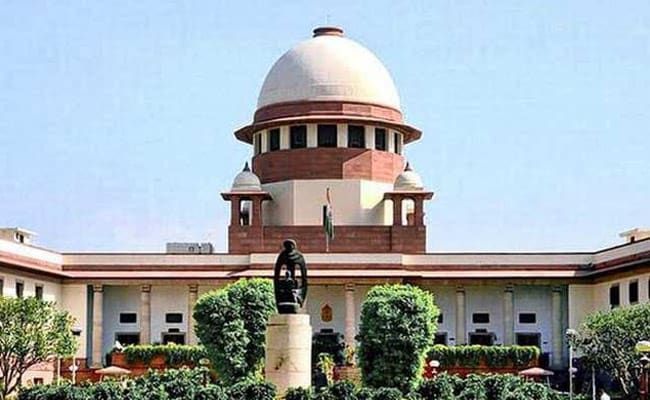Places of Worship Act: Hearing in Supreme Court regarding survey case of Gyanvapi Masjid
New Delhi:
An important hearing is going to be held in the Supreme Court on Tuesday in the Gyanvapi Masjid case.
In the petition, the Masjid Committee has termed the order of the Varanasi court to survey the mosque as a violation of the Places of Worship Act.
Now the bench of Justice DY Chandrachud and Justice PS Narasimha will hear the matter in the Supreme Court.
The special thing is that Justice DY Chandrachud was included in the five-judge bench that delivered the verdict in the historic Ayodhya case on 9 November 2019, which had stamped the Places of Worship Act 1991, calling it a good law.
In fact, in July 2021, the Supreme Court had agreed to test the validity of the 1991 Places of Worship Act (Places of Worship Act).
The court had issued a notice to the Government of India in this matter and sought its response.
Demand to abolish Places of Worship Act
BJP leader and lawyer Ashwini Upadhyay, in his PIL, has sought the repeal of the Places of Worship Act, so that the mistakes of history are rectified and the places of worship of other religions and places of worship by Islamic rulers in the past. Pilgrimage sites were demolished and Islamic structures were built over them, so that they could be handed back to those who deserved them.
Gyanvapi Masjid Case: Seal the area where Shivling was found, orders of Varanasi Court
Ashwini Upadhyay has said in his petition that the provisions of the Places of Worship Act 1991 are arbitrary and unconstitutional.
The said provision violates Articles 14, 15, 21, 25, 26 and 29 of the Constitution.
The Places of Worship Act 1991 interferes with the Right to Equality, Right to Life and Right to Religious Freedom in the Constitution.
The central government has made this law by going out of its jurisdiction.
Worship and religious subjects are state subjects and the central government has made arbitrary laws in this matter.
Gyanvapi case: Muslim side claims, country is being misled by saying fountain as Shivling
He said that Muslim rule in India was established in 1192, when Muhammad Ghori defeated Prithviraj Chauhan.
From then till 1947 India remained under foreign rule.
Therefore, if a cut-off date is to be fixed to preserve the character of religious places, it should be 1192, after which thousands of temples and shrines of Hindus, Buddhists and Jains continued to be destroyed and destroyed or damaged by Muslim rulers. converted them into mosques.
What is Places of Worship Act
The then Narasimha Rao government of the country had enacted the Places of Worship Act i.e. Places of Worship Act in 1991.
The purpose of bringing the law was to pacify the growing intensity and ferocity of the Ayodhya Ram Janmabhoomi movement.
The government has made a provision in the law that the claim of people of other religions will not be accepted at any place of worship in any place of the country except the Babri Masjid in Ayodhya.
It said that on the day of independence of the country i.e. 15th August, 1947, no religious structure or place of worship, in whatever form, would be claimed by people of other religions.
Ayodhya's Babri Masjid was excluded from this law or it was made an exception.
Because this dispute was pending in the courts before independence.
It has been said in this act that the religious place which belonged to the religious place on August 15, 1947, will remain of the same community today and in future also.
However, the Ayodhya dispute was kept out of it because the legal dispute over it was going on earlier.
One such petition has been filed by the priests' association through advocate Vishnu Shankar Jain.
The Public Interest Litigation has also demanded the Supreme Court to repeal the Places of Worship Act of 1991.
So that the dispute between the birthplace of Krishna in Mathura and the Kashi Vishwanath temple-mosque in Varanasi can be settled.
Vishwa Bhadra Pujari Purohit Mahasangh, an organization of Hindu priests, has challenged the provision of this Act.
It has been said in the petition that this Act has never been challenged nor has any court considered it judicially.
Even in the Ayodhya verdict, the Constitution Bench had only commented on this.
However, the Muslim organization Jamaat Ulama-e-Hind has strongly opposed this petition.
He told the Supreme Court that this petition is a fraudulent attempt to rectify the mistakes of history.
He has warned that if the Supreme Court takes an interest in this, then the country will be flooded with cases and petitions.
The petition has been opposed in the application that the court should not issue notice on this petition.
Issuance of notice in the case will create fear in the minds of the people of the Muslim community regarding their places of worship, especially after the Ayodhya dispute.
This case will destroy the secular fabric of the nation.
Demand to make him a party in this case in the application.
Significantly, the Supreme Court in its 1,045-page judgment on the Ayodhya Ramjanbhoomi dispute had cited this 1991 law to say that this law guarantees against alteration and preservation of the religious character of public places of worship on August 15, 1947. .
The Supreme Court had said that the law gives an assurance to every religious community that their religious places will be protected and their character will not be changed.
The Places of Worship Act is a provision made by the legislature which makes maintaining the religious character of places of worship as an essential aspect of our secular values.
This is a good law.
